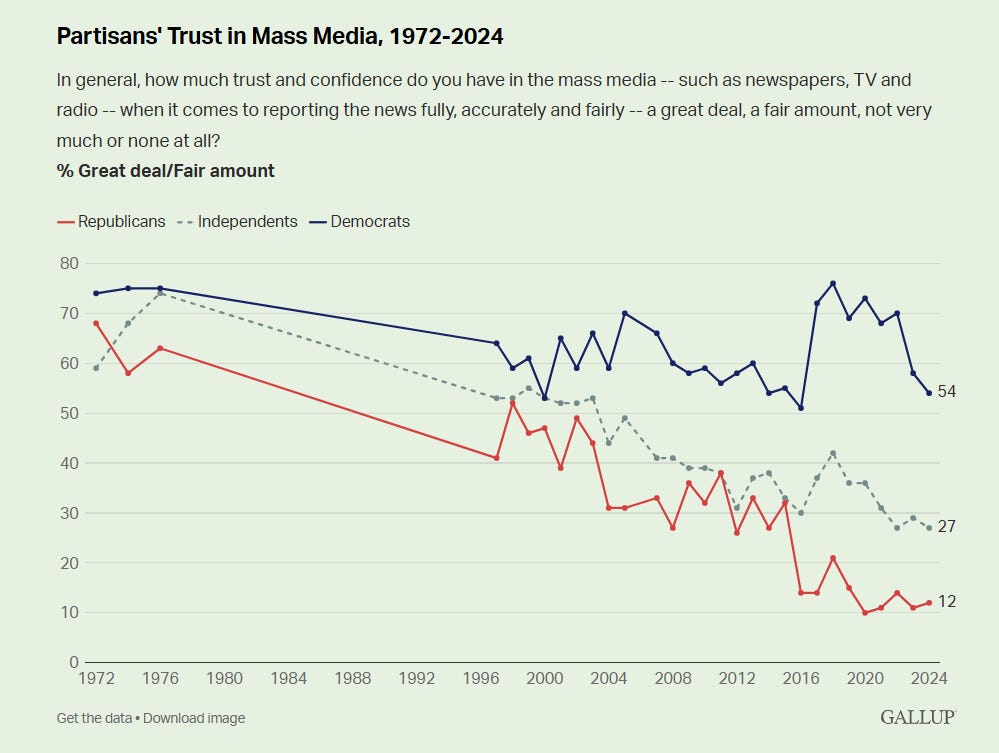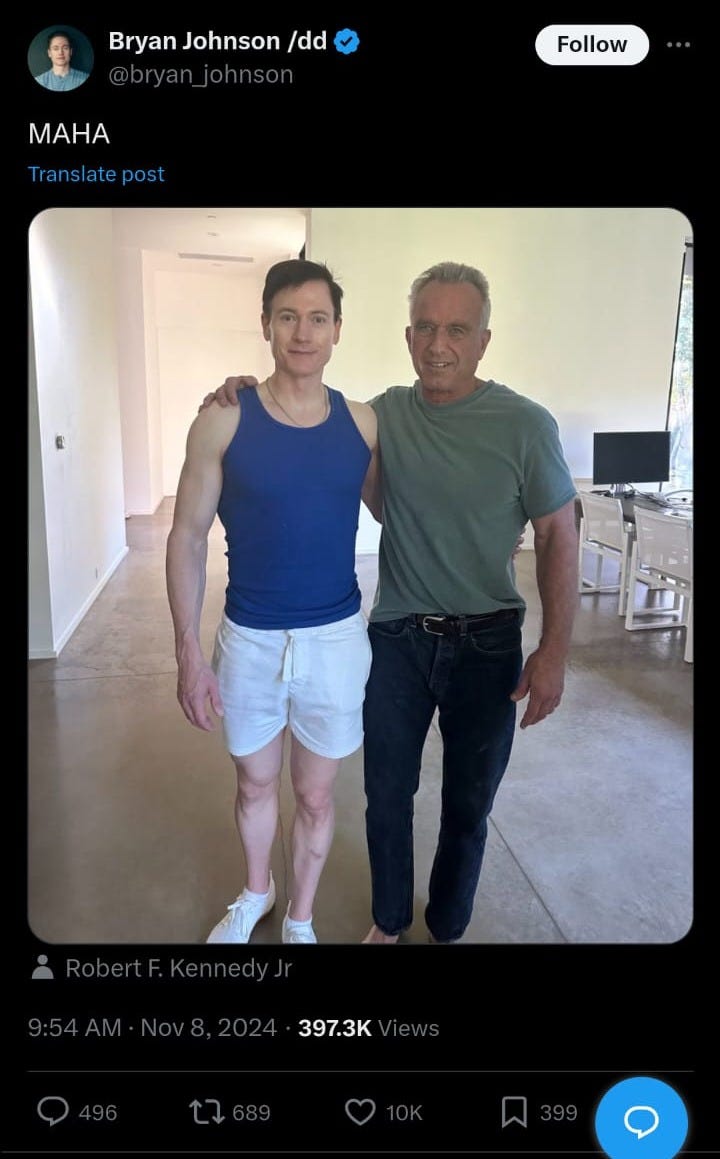The Internet is Real Life. It Doesn't Have to Be.
Why we need to touch grass more than ever
On my run this morning through Georgetown, I overheard five conversations that started with the phrase, “No no no, this is why Trump won.”
I only ran for sixteen minutes. I’ll let you be the judge of if I’m kidding or not.
This blog will not serve as me Monday Morning Quarterbacking the election results. I’ll leave the hot taking to the professional pundit class. Some folks are past the point of over-analyzing everything, anyway; after all, Stephen A. Smith is already planting the seeds for his own presidential run in 2028.
But I do certainly have some thoughts that, broadly speaking, pertain to the Internet, media, civic life, and more. In other words: here’s a new blog, same as the old blog.
— NGL
P.S. Last blog, I wrote about the perils of fame, the magic of collaborations, and the beauty of funiculars. If you missed it, check it out here.
I think the Internet is real life. In the last ninety-six hours, out of all of the thinkpiece wool that has naturally been spun, the one I probably agreed with the most came from writer and activist Jeremiah Johnson.
A lot of sentiment has arisen in online echo chambers highlighting how this year marked the first “Influencer Election,” or “Podcast Election,” and that Democrats and left-leaning folks “need their own Joe Rogan”—i.e. someone to openly promote their campaigns (without pushback) to wide, young audiences. Johnson agreed to this sentiment with an essay that proclaimed the election as a victory for “online spaces” over “traditional institutions”:
“It’s almost more correct to say that people knocking on doors need to get off the street and get back on the internet. It’s more important to win Joe Rogan than it is to win James Mattis.
Social media is now more real than real life, and the politicians who recognize that are the ones who will win.”
The people rising into power certainly seem to think this, too. The final thing that UFC president and longtime MAGA loyalist Dana White did while giving a victory speech alongside Trump on Election Night was thank a smattering of creators—for lending their platforms, as well as their endorsements. This group included prank YouTubers the Nelk Boys, controversial streamer Adin Ross, and “the mighty and powerful Joe Rogan,” as White put it (The Daily Beast described this clip as “possibly the strangest extension of gratitudes since George Washington was elected in 1789”).
We’ll ignore the fact, for now, that Rogan endorsed Bernie Sanders in 2020, or that the Nelk Boys’ founder, Kyle Forgeard, isn’t even a U.S. citizen (and therefore couldn’t vote). We’ll also ignore the fact that nearly every political incumbent has lost in 2024, with many pointing to inflation as the main driver in this trend.
What I’ll say instead is that the media we consume becomes our reality, and at no point in time has that felt truer than now. Sure, no Haitians were eating cats and dogs in Springfield, Ohio. But if your “For You” algorithm is feeding you AI-generated images of innocent puppies in between slices of Wonder Bread—and an entire world’s worth of commentators (along with Russian bots) are at your fingertips—it might as well be the oft-entertaining, oft-frightening reality you choose to live in.
We’re experiencing a loneliness epidemic, after all, and phones are the root cause. A recent survey found that while scrolling, fifty percent of teenage participants said they had not spoken to anyone in the last hour, either in person or online. While most research has focused on adolescents, experts have said that their findings apply to older demographics, too. In other words, at least commenting on that AI puppy post is a way to feel connected to something.
Here’s where I’ll pause. While I can be a cynic in practice, I’m an optimist at heart, one who dabbles a bit too much in a drug called idealism. And I believe that this notion that “knocking on doors doesn’t win you elections, therefore we need to build our own Joe Rogan” thoroughly misses the forest for the trees.*
Because…
…I think the Internet doesn’t have to be real life if we choose so. On my penultimate evening in Geneva, Vicky and I went to one of the city’s oldest restaurants to finally try some traditional Swiss cheese fondue.
We stumbled upon the art and history museum on our walk back, where the city was hosting a free light show. Graphics and illustrations danced across the museum’s walls as music from The Beatles and more gently permeated through the air. Kids sat on the grass at the park across the street, parents sipped beers, and young couples draped their arms around one another.
Two days later, I hopped off the plane with my suitcase and made a beeline from Dulles to DC, where I waited in line for three hours to vote. The night, of course, unfolded as it did, and all I saw was more and more red as I continued to refresh The New York Times app in the dark.
Looking back on it, I can’t help but juxtapose the two experiences. Not because they were directly opposed, per se—more so because it made me appreciate the kind of world I want to live in.
Trust in institutions is hitting all-time lows across the board. Consider mass media: Only thirty-one percent of Americans express confidence in newspapers, television, and radio to report the news “fully, accurately and fairly,” according to Gallup. That’s less than the thirty-six percent who don’t trust the media at all.
The news media was never unbiased—and certainly never representative of the communities it serves. But the scary part is where all that trust is being funneled instead. The conservative media ecosystem works because billionaires fund the PragerUs and Turning Points of the world in an effort to serve their interests, spinning out stars who rail against “the élite” online while cashing checks from the very group they demonize. Russian operatives were paying influencers including Tim Pool and Benny Johnson four-hundred thousand dollars a month to spread Pro-Kremlin talking points; Pool and Johnson claimed they were unaware, yet still somehow pretended to believe that their shit videos were worth that much money in a free market anyway.
Given the broken nature of this ecosystem, I don’t believe that ratcheting up the volume and fighting fire with fire solves anything for anyone. The Internet increasingly values individuals who can make lots of cheap, attention-grabbing content. These technologies have destroyed our sense of community and tethering to the real world.
What does solve problems? Re-investing our energy into civic life.
The silver lining found in Gallup’s surveys is that the most-trusted institutions are our local governments. It’s easier to see how our institutions are working when we’re experiencing them on a day-to-day level. Join a run club, and you’ll meet people while jogging through Central Park or Venice Beach. Take the car for a weekend trip, and stumble upon our majestic national and state parks—while driving on roads maintained by nearby towns. Hell, I’m writing these words from the beautiful Cleveland Park Library, a seat from which many of my favorite pieces have emerged and books have been read.
There’s work to be done, of course. Regarding the latter, librarians around the country have been leaving the profession as their workplaces have become culture war hotspots and public stages for social problems. These institutions have a direct relationship with the people they serve; they can only foster an environment as healthy as the community surrounding them. That’s where we come in—by hosting events, donating money when we can, and volunteering our time and expertise where it’s relevant.
The more involved we feel with our local communities, the more likely we are to consume local media. That media can take many forms—newsletters, podcasts, and YouTube channels among them.** And if that’s the media we consume, it will become our reality, and we’ll be more prone to trusting our institutions and approaching our world in a productive manner.
Maybe I’m naive, and if I want more nighttime light shows, I should just move to Europe full-stop. But as I look ahead as to my own personal priorities in 2025 and beyond, I truly believe this bottom-up approach is the right way forward—not celebrating “the next Joe Rogan.”
I think this is just about the worst thing I’ve ever seen.
That’s RFK Jr. standing with Bryan Johnson, the forty-five-year-old tech CEO who’s obsessed with anti-aging—and has openly talked about undergoing shock therapy on his genitals to make them functionally younger.
I will provide no further comment.***
I think Joe Biden has (and always had) a marketing problem. Stop me if you’ve heard the phrase “Bidenomics.” I hadn’t, until reading this phenomenal, lengthy piece from The New Yorker.
In the aftermath of the election, it unfortunately appears that we’ll remember Joe Biden most for a) inflation and b) not stepping aside after the midterms. Yet his ultimate legacy was the policies he did enact while in office—and they might never get a chance to take their full form.
Consider the Inflation Reduction Act, passed in 2022. A good chunk of the companies that are benefitting from its tax credits are focused on clean energy. About eighty percent of the act’s projects are being built in Republican districts, bringing three-hundred thousand steady jobs with them. The package is so good for manufacturers that European countries are reportedly upset that their companies are choosing to open factories in the U.S.
Ironically, the wide-ranging policies were formed by a task force put together by Senator Elizabeth Warren—herself a politician who failed to market herself well during a presidential run in 2020.
Once inside the Oval Office, Trump may dismantle Biden’s moves in the name of appeasing fossil fuel lobbying groups and more. He may instead take credit for them while their effects start to take shape, as they’re already set to heavily benefit his voter base.
One thing’s for certain, though: Politics, like everything, has become all about marketing. If Biden (and Harris by extension) had taken more credit publicly for the work their administration has done, I do wonder if we’d be in a different timeline.
I think Blonde (2016) is the ultimate airplane album. This blog has been heavy with several shots of political-adjacent writing, so here’s a bit of a chaser.
Upon flying back from Geneva, I was reminded why Frank Ocean remains undefeated at making me go schleep (in a good way) on planes. When “Nikes” comes on, I’m out like a light as soon as the word “These” graces my headphones. Roughly fifty minutes later—after dreaming a thought that could dream about a thought that could think of the dreamer that thought—I’m waking up to the heavenly “Seigfried.”
A friend of mine recently remarked how Frank has locked up our entire generation, that we all really grew up on his music. Given Channel Orange (2012) recently reemerged as the number three album on the Billboard R&B charts—behind Blonde, which sits at number two—I think my friend’s assertion has proven correct.
So…yeah. I left Geneva. Vicky is about one week into her new job. It hasn’t been the easiest, but we’ve done long-distance before and are making it work.
I have a lot of updates to share soon, but it felt silly in a week with such a historic, consequential event. What I will mention is that I’m planning on visiting Chicago sometime in the next couple of weeks. If you’re in the city or nearby, I’d love to say hi!
Thanks for reading! Shoot me a reply or DM if anything resonated with you in particular—I respond to them all.
* I’ll acknowledge here that political strategists (whose jobs are to win elections at all costs) will naturally feel differently than me. Additionally, I’ll acknowledge my privilege in discussing these topics, as a second Trump administration will not affect me the same way it will potentially affect undocumented immigrants, residents of areas affected by climate change, or women in certain states.
** As local media has struggled, there’s a lot of interesting research out there finding that governments subsidizing subscriptions actually saves taxpayers money, because a well-read community leads to less leaders stealing from their respective towns.
*** Okay, one more comment. The week before Vicky and I left Venice, we realized that Johnson lived around the block from us. The entire five-minute walk over to see his house was full of NSFW humor.








